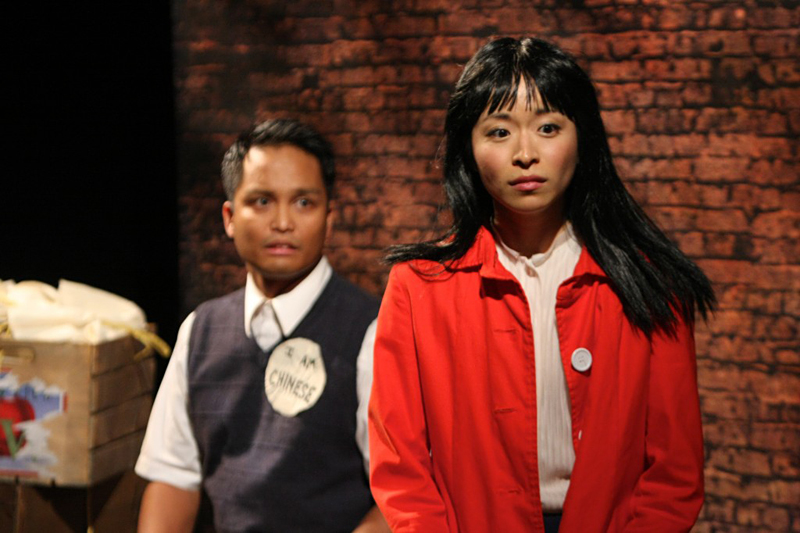Book-It’s new and successful box-office formula works like this: bestseller + local setting + underrepresented ethnicities + controversial/long-repressed chapter of history = nearly the whole run sold out, then extended (twice) and extra performances added, but demand still outstrips ticket supply. It helps that Jamie Ford’s 2009 novel relates a Romeo and Juliet–style puppy-love story in Seattle’s International District just before World War II. It helps further that Henry and Keiko are portrayed by manga-adorable Jose Abaoag and Stephanie Kim. However, sweet as their romance may be, nearly three hours of it is just too bounteous. Adapter/director Annie Lareau’s play treats the book’s 40-year time span like a movie, resulting in too many scenes (some very short) and restless legs. One intermission isn’t enough.
Henry, a 12-year-old Chinese-American, is granted a bit of wartime protection by the “I Am Chinese” button his protective father insists he wear to evade Japan-bashers after Pearl Harbor. Keiko, the 12-year-old American daughter of Japanese immigrant parents, has no such defense. Their school-born crush unfolds slowly over dozens of vignettes cradled in Carey Wong’s simple interiors and streetscapes, depicted on black-and-white flats. Swing music from the ’40s perks up the frequent set changes, many of which feel livelier than the scenes. Per Book-It’s custom, young Henry narrates the story and relevant political issues, sprinkled with his charming schoolboy observations. Interspersed throughout are scenes of the grown Henry (Stan Asis) rediscovering Keiko’s things in the basement of the Panama Hotel.
Marcel Davis performs acting magic in the contrived role of Sheldon, an older street-musician friend of Henry’s who, genie-like, accedes to Henry’s every wish, even accompanying him to Idaho when Keiko’s family is forcibly interned in the Minidoka detention camp. Back in their Seattle school, Marianne Owen invigorates the role of crabby cafeteria witch Mrs. Beatty, who later becomes a crucial ally. Asis’ low-energy delivery works nicely as the brokenhearted older Henry, a widower suddenly on the scent of long-lost love.
Although the script begs for a haircut, there’s no denying its impact. Seven decades later, wartime internment and the destruction of our Japantown are still felt in Seattle, where Ford grew up (his family changed its surname from Chung). Sitting near me in an attentive full house, a gentleman sobbed openly for long stretches. Two or three generations removed, Hotel‘s story still touches some local families directly. They probably won’t complain about its length.








